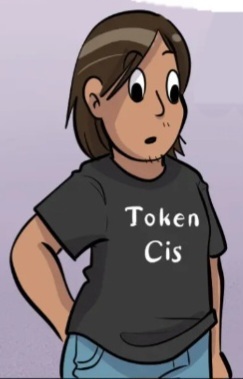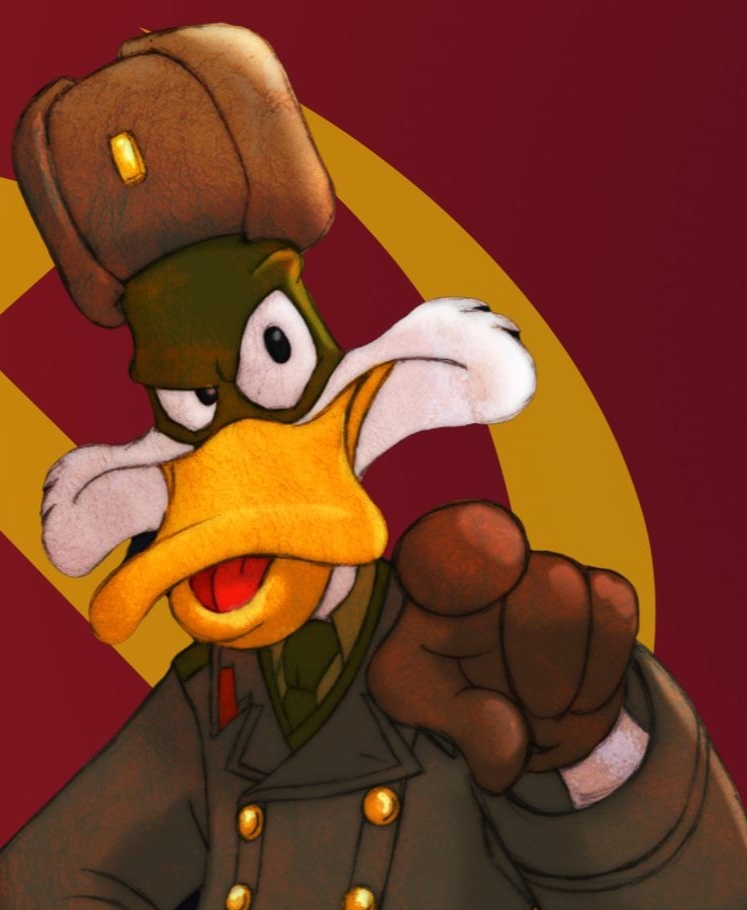My sibling likes to read fiction. They’re a comically basic-ass shit-lib. This person says that they don’t like to talk about politics. They always take the bosses side at work, basically a reincarnation of our Rachel Maddow-parroting boomer capitalist fucboi parent.
I know it’s a tall order but: What work of fiction can I gift them that will break them out of their capitalist complacency and remind them that they’re nothing more than a wage slave before they can even resist the indoctrination? I want to be subtle but effective; it has to fly to under their radar.
To give you an idea of how hopeless this little lemming is: this person has been reading Vonnegut lately and legitimately didn’t even know that Eugene Debs was a real person. This person figured it out when I informed them of Debs when they were telling me that no one has ever run for President from a jail cell. 🤦🏿♂️
Halp!
Unfortunately, I don’t think fiction is that great at this, but John Steinbeck has to be my pick. Grapes of Wrath is easily one of the best books I’ve ever read
I second Grapes of Wrath. Just recently read it for the first time and the parallels of what’s happening now are

I read Grapes of Wrath a few years ago after enjoying Of Mice and Men from school. I’m not bad with reading but I wasn’t sure how far I’d get with the thickness of it, then I finished it real quickly.
But it was a gripping book and is certainly upfront about the problems of capitalism. If your family is that politically illiterate then it may fly under the radar, as Steinbeck doesn’t use explicit capitalism/communism terminology, just more a factual description of what people/systems of people are doing.
Well I think that’s the best way to do it. It’s up front about issues, there is no language to abstract what is actually happening in that book and I think that’s what sells it.
Maybe The Dispossessed?
I second this, this book put my teenage ass on the path to anarchism
it is the best book I know of for showing what living in an alternative to capitalism could be like
I agree. not fluffy romanticization, just a plain, often harsh existence but shown in clear contrast with the excesses of capitalism. send me to Anarres now.
Same here. Just an excellent, unflinching look at the benefits and drawbacks of living in a very, very different way than we do. It’s really eye-opening if all you know about anarchism is what you’ve gotten from pop culture.
A Bug’s Life
first of all be a lil nicer to them, they’re your family and you’re grown ups.
second of all philip k dick is the answer. no guarantees it will radicalize them, but it’ll limber up their gray matter.
Is he a reader who will read on his own? Can you show em steinbeck simply because he’s a great American writer? Like don’t show him “grapes of wrath” but maybe “tortilla flat” or “east of eden” and see if he comes back for more.
Maybe some Kim Stanley Robinson?
Yes or Iain m banks if they like sci-fi
maybe some china mieville? bas-lag trilogy is weird fantasy steampunk on the surface, might fly under the radar.
What’s wrong with reading Vonnegut
 and not knowing who
and not knowing who  was is just normal. Most people can’t name an unsuccessful politician from 100 years ago.
was is just normal. Most people can’t name an unsuccessful politician from 100 years ago.I don’t think any text will do what you’re hoping, that kind of progress is usually made through conversation. But I’d recommend George Saunders’ In Persuasion Nation (2006), which is a short story collection about cranked up capitalist inconsistencies. He’s a lib but he’s got a good radar for the savage idiocy of a society under late stage capitalism.

Alternatively I might suggest The Fever (1991) by Wallace Shawn.
Based Grand Nagus.
I’ve heard good things about Steinbeck’s In Dubious Battle, which is about labor action
The Jungle is like the opposite of a fun read so it might not be good for this purpose, but the Fun Trivia Fact that everyone utterly fucking missed the point really got under my skin and was a seed of my own leftward move. The idea that this story had such a huge real life impact but in a way that didn’t address the actual point of the story at all was super memorable but also non-threatening at the time, it was just a fun bit of american history trivia.
Foundation by Isaac Asimov
The Dispossessed by Ursula Le Guin
Ishmael by Daniel Quinn
Here’s some background copypasta about it:
The Dispossessed | Book Introduction The Dispossessed is a thought-provoking science fiction novel written by acclaimed author Ursula K. Le Guin. First published in 1974, it is the fifth installment in Le Guin’s Hainish Cycle, a series of interconnected novels and stories set in a future universe where an interstellar confederation, known as the Ekumen, strives to unite different worlds through peaceful means.
Set on the twin planets of Urras and Anarres, The Dispossessed delves deep into themes of social, political, and economic inequality, contrasting the contrasting societies of these two worlds. Urras is a rich and capitalist planet resembling our own Earth, dominated by nation-states, wealth disparities, and exploitation, while Anarres is an anarcho-syndicalist society established as a utopian experiment by an enclave of revolutionaries who emigrated from Urras.
The protagonist of the story is Shevek, a physicist from Anarres who challenges the existing structures of his society. Shevek is a brilliant scientist who invents a revolutionary theory called “simultaneity” that could potentially revolutionize interstellar communication. However, he faces opposition and bureaucratic hurdles on Anarres, where the social and political order has become stagnant.
Driven by a desire for intellectual and personal freedom, Shevek embarks on a journey to Urras, hoping to continue his research and observations in a society that values scientific progress. There, Shevek struggles to navigate the complexities and contradictions of a capitalist world, where he encounters both genuine collaboration and dangerous manipulation.
Through Shevek’s experiences on both planets, Le Guin presents a powerful commentary on the flaws and potential of different systems of society, challenging the reader to question the status quo and imagine alternative ways of organizing human communities. The novel explores themes such as capitalism, socialism, anarchism, freedom, and the inherent struggles and compromises involved in creating a just and equitable society.
Le Guin’s storytelling prowess shines in The Dispossessed, blending elements of political philosophy, sociology, and science fiction into a compelling narrative that engages the reader intellectually and emotionally. Her vivid and evocative descriptions of the contrasting environments on Urras and Anarres bring these worlds to life, offering a nuanced exploration of the impact of societal structures on individual lives.
The Dispossessed is not just a story of personal and scientific discovery but also a profound meditation on the crucial need for understanding, empathy, and collaboration between different societies and cultures. Le Guin brilliantly challenges the foundational assumptions of human social systems, ultimately reminding us of the potential for creating a more just and equitable future.
With its richly drawn characters, compelling ideas, and thought-provoking narrative, The Dispossessed continues to captivate readers, cementing its status as a timeless dystopian classic and a cornerstone of science fiction literature. By exploring the intersection of politics, philosophy, and human nature, Le Guin offers a deeply introspective and visionary work that invites readers to question their own beliefs and imagine new possibilities for the world we live in. 5 Key Lessons From The Dispossessed
-
Exploration of Anarchism: “The Dispossessed” provides a critical examination of anarchist society on the planet Anarres. It explores the challenges faced in establishing and maintaining a society based on communal ownership and lack of hierarchy. The book delves into the strengths and weaknesses of anarchism as a political and social system.
-
Societal Boundaries and Isolation: The novel emphasizes the consequences of societies isolating themselves and setting boundaries. Anarres, located in a distant moon, faces isolation from its neighboring planet, Urras. This isolation leads to limited resources and a lack of outside influence, ultimately affecting Anarres’ development and relationship with Urras.
-
The Struggle for Utopia: “The Dispossessed” highlights the relentless struggle to establish a utopian society. It explores how even in what may seem like an ideal system, there are still conflicts and contradictions. The book raises questions about whether true utopia is attainable and the sacrifices required to strive for it.
-
Balance between Individualism and Community: One of the central themes in the novel is the tension between individualism and the collective. It explores the challenges of maintaining individuality and personal freedom while also working for the benefit of the community. Le Guin presents different perspectives on balancing individual desires with the needs of a society.
-
Critique of Capitalism and State Power: “The Dispossessed” offers a critique of capitalism and state power through the juxtaposition of Anarres and Urras. Urras represents a capitalist society with hierarchical power structures, while Anarres embodies a more egalitarian and collectivist approach. The book questions the societal impacts of these systems and highlights the potential for exploitation and inequality under capitalism.
-













